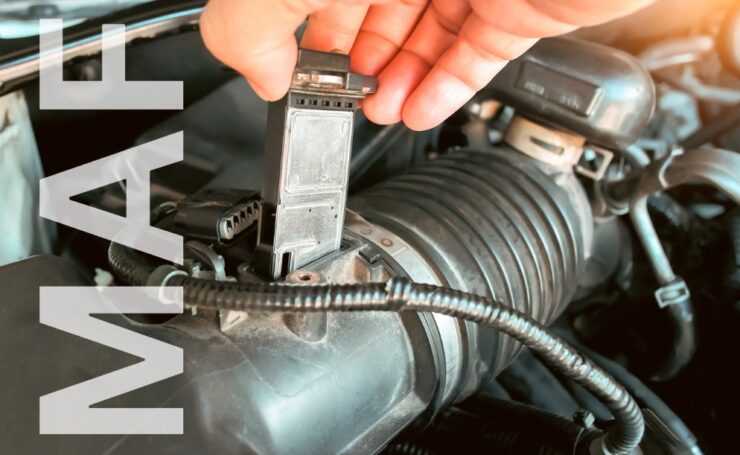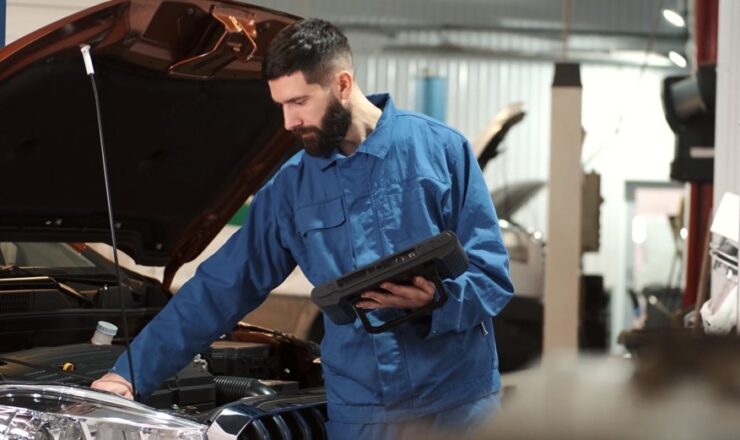There are few things more frustrating than feeling like you can’t trust your car to get you from one place to another. If your car is jerking when you accelerate, it can leave you feeling a bit uneasy on the road.
In this blog, we’ll explore why your car could be jerking and what steps you can take to fix it. Let’s get started!
Having your car jerk or shudder when you accelerate is a fairly common issue, especially in older cars. Usually, this jerking can be caused by a variety of factors and is sometimes accompanied by noise.
The main culprits behind this issue are the ignition system, fuel system, clutch, exhaust system and transmission. It’s important to narrow down the root cause of car jerking before attempting any kind of repair work as fixing the wrong thing can be costly and can affect your driving performance.
In this guide, we’ll cover all these possible causes and explain how to diagnose them:
- Ignition System
- Fuel System
- Clutch
- Exhaust System
- Transmission
Symptoms of Car Jerking When Accelerating

Car jerking when accelerating can be caused by a variety of issues, ranging from minor to severe. Understanding the symptoms of car jerking when accelerating can help you diagnose the problem and take the appropriate steps to repair it.
Common symptoms may include:
- A shaking or shuddering feeling while driving, as well as an irregular up-down motion in your vehicle’s RPMs.
- Unusual noises like clunking, thumping, thudding, axial noise or whining coming from your car engine.
- Reduced engine performance, black smoke coming out of your tailpipe or an illuminated check engine light on your dashboard.
If you suspect that there may be an issue with acceleration in your vehicle, it is important to get it examined by qualified technicians as soon as possible.
Common Causes of Car Jerking
If you experience jerking or bucking when accelerating your car, this can be caused by a variety of issues. Engine misfiring, poor fuel pressure and incorrect spark plug timing are all possible culprits for car jerking. Below are some of the most common causes of car jerking:
Engine Misfire
When an engine misfires, it’s usually caused by either an ignition problem or a fuel delivery issue. When the computer senses that there is an issue with one or more cylinders, it will reduce power until the misfire is fixed.
Fuel pressure
Poor fuel pressure in your car can cause your engine to run erratically when you accelerate. This can be caused by a clogged fuel filter or inadequate fuel pressure regulator.
Incorrect Spark Plug Timing
If the timing of spark plugs is off, this will cause a jerk as your car tries to accelerate correctly. A bad coil pack could also cause improper spark plug timing and cause unwanted jerking during acceleration attempts.
Transmission Issues
As transmission shifts from one gear to the next there can be irregularities if not properly lubricated and maintained regularly. Jerking during acceleration could indicate that something is wrong with either your transmission fluid or solenoid valve possibly needs to be replaced.
Mass Air Flow Sensor (MAF)

If there is excessive air flow entering your engine as opposed to the necessary amount required for acceleration it could cause similar engine jerks that feel on like a jerk in neutral gear. Check your MAF sensor for any build up dust and dirt which may need cleaning out before it causes long-term concerns while operating your vehicle.
Fuel Contamination
Dirty gasoline often contains water impurities which tend to affect engines causing seizures or stalls when shifted into overdrive mode with certain gears, especially at high speeds on highways and major roadways.
This can also be caused by using the wrong type of oil in your engine. If you have a diesel engine, you should use full synthetic oil. This type of oil provides better lubrication and can help prevent your engine from jerking.
Some other causes include:
- A clogged air filter
- Dirty fuel injectors
- Worn-out oxygen (O2) sensors
- Problems with your fuel pump or fuel filter
- An electrical issue with wiring or sensors
- Malfunctioning mass airflow sensor (MAF)
- Faulty oxygen sensor readings
- An incorrect idle speed setting
If your car jerk hasn’t gone away after addressing these common causes, it could also be caused by an engine misfire, catalytic converter problems, trouble in the powertrain control module (PCM), bad engine mount, clogged catalytic converter, worn out transmission parts and low oil pressure.
To accurately diagnose your car’s jerking issue, have a certified technician inspect it to confirm any potential issues that can be fixed.
Repair

In order to determine the cause of the problem and find the best solutions to repair your car jerking, it is recommended that you visit an auto technician. Your technician will check your vehicle’s systems such as fuel pressure, spark plug gap and air filter for dirt blockage before attempting any repairs or replacements.
They may also use diagnostic computer software on newer model cars in order to pinpoint any problems with sensors or control modules.
Once they have identified the cause of your car jerking they will advise you on how to proceed with solving it which may include replacing worn-out parts like spark plugs or filters as well as making adjustments to gasoline pressure and idle speed settings.
If the issue has been caused by something more serious like a damaged catalytic converter or internal engine component failure then they will inform you of all available solutions including component repairs and replacements depending on the severity of damage involved.
Preventative Maintenance
A jerking sensation when accelerating is either caused by a low transmission fluid level or incorrect engine timing. To ensure regular, smooth acceleration, it’s important to have your car undergo preventative maintenance regularly. This should include an inspection of the transmission fluid level and a check of the engine’s timing.
If the fluid level is low, an experienced mechanic will refill it as necessary. Low levels can be caused by a leak in the system or normal wear and tear on some parts. Additionally, if your car isn’t running at its optimal condition because of incorrect engine timing, your mechanic should be able to adjust it accordingly if needed.
If you are experiencing any jerky braking sensations or sudden violent acceleration when you start up from a full stop, it’s best to consult with a certified technician as soon as possible in order to avoid any future complications and ensure that your vehicle is functioning properly for years to come.
Cost of Repairing Car Jerking

When your car starts to jerk or shudder when you accelerate, it’s usually a sign of an issue with the vehicle’s transmission system. The jerking may be caused by something as simple as a dirty air filter or an issue with the fuel injection system, but it might be something more serious such as a slipping clutch or faulty transmission cogs and drive belts. In some cases, the jerking could even be indicative of a transmission failure.
If you sense that your car is jerking when accelerating, it is important to bring it in for inspection as soon as possible. The cost for diagnosing and repairing this issue can vary depending on the underlying cause of the problem. Common repairs can cost anywhere from $150 to over $1000 depending on how extensive the repairs need to be.
If your vehicle needs major transmission repair work, you could end up paying closer to $4000 dollars or more if you need to completely replace the entire unit.
It is best if you bring your vehicle to a certified mechanic so they can diagnose what is causing your car to jerk when accelerating and provide an accurate estimate of how much an adequate repair will cost. This way, you can make sure that any repair work done meets all safety requirements and that any issues present are dealt with properly before driving on regular roads again.
FAQ

Is it safe to drive a jerking car?
If your car starts jerking while you’re driving, the first thing you should do is check the engine light. If it’s illuminated, that means there’s a problem with the engine that needs to be addressed. If the light isn’t on, try troubleshooting some of the common causes of engine hesitation, like a dirty air filter or faulty spark plugs.
Can distorted car tires cause juddering?
Yes, distorted car tires can cause juddering. Judder is a vibration that is felt through the steering wheel, seat or floor of the car and is usually caused by a problem with the suspension or wheels. Distorted tires are one possible cause of juddering, as they can throw off the balance of the wheel and cause it to vibrate. If you’re experiencing juddering, it’s important to have your car checked out by a mechanic to rule out any other potential causes.
Will my car stutter if I need an oil change?
Many people believe that their car will start to stutter when it needs an oil change. However, this is not necessarily true. While it is important to keep up with your car’s oil changes, there are other factors that can cause your car to stutter. If your car starts to stutter, it is important to take it to a mechanic to get it checked out.
Why Does My RPM Go Up and Down While Parked?
If your RPM needle is bouncing up and down while your car is parked, it’s likely due to a problem with the idle control valve (ICV). The ICV is responsible for regulating the amount of air that flows into the engine when the car is idling. If it’s not working properly, it can cause the engine to rev up and down.
Conclusion
In conclusion, it is important to note that there are several potential causes of a car jerking when accelerating. Depending on the type of car you drive as well as its age and condition, it’s possible that the issue could be caused by something as simple as a clogged air filter or a more complex problem related to the fuel injection system or engine itself.
In any case, it is recommended to have your car inspected – preferably by an experienced technician – in order to determine the root cause of the jerking and take whatever steps may be necessary for a successful repair.

